Rob J. Hayes's Blog, page 21
November 21, 2016
Review Blog - Wraith Knight by C.T. Phipps
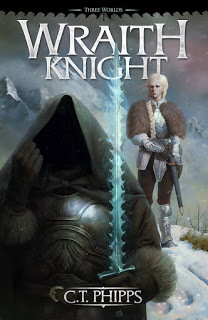 Artwork by Alex Raspad... who also does my book covers. We love Alex.
Artwork by Alex Raspad... who also does my book covers. We love Alex.Apparently it's customary to note that I received an ARC version of the book in return for an honest review. I also received that ARC about a year prior to release and I'm reliably informed that those pesky typos and what not have been cleaned up.
On a personal note this was one of the first ARCs I was given to read... my Kindle is now full of the damned things.
So Wraith Knight is the story of Jacob Riverson. Jacob was the greatest hero of his age and a shining light against the darkness... right up until the big bad dark lord guts him like a fish. The end. Well, not quite. Jacob wakes up a few hundred years later only to discover the big bad has been using his body (and possibly soul) as a weapon against the forces of light. In short, after being brutally cuddled to death by sharp objects, Jacob was turned into a Wraith Knight (see Ring Wraith). But the surprises aren't quite done for poor Jay-Jay and he's reliably informed by the big bad itself that evil kinda lost the war on purpose because the big bad was just a bit bored of being the big bad. But it's OK, because humanity is a vile species and there's always another war just around the corner. Oh, and the world needs evil so the big bad has volunteered Jacob for the role. No auditions necessary. And that's pretty much where the book starts.
We follow along with Jacob and his growing (and shrinking) collection of super friends (I say this literally as everyone with a name seems to have a super power of some sort) as they attempt to right the wrongs of the world by becoming... evil.
So I described the book as “A mix between Lord of the Rings and World of Warcraft with more epic battles than a 40-man raid.” (Yes. I was there at the beginning. I killed Ragnaros and it was glorious). And there sure are epic battles. The pace of the book is so fast that every time Jacob goes anywhere, there's someone to fight. Add into this a poorly defined magic system and you'll soon find that anything goes in the battles. Sometimes there's swords, sometimes there's magic, sometimes there's monsters. And just when you think the battle is over, the action refuses to relent and Jacob find himself thrown into more conflict.
It's obvious from the get go that Charles has put a lot of thought into the world he's created and there's plenty of lore to back up the action with frequent flashbacks to Jacob's... life (read past) and his journey takes us through much of the world so we get to discover a lot about it. He's obviously borrowed from a lot of well established worlds in terms of monsters and other sentient races, but usually puts his own slight spin on them.
The plot is fairly straight forward (at least at first glance) and Charles does a good job of internalising the struggle Jacob faces between wanting to be good and realising that the only way to be good is to be a little bit bad... or a lot bad. Sometimes the world is so messed up it needs an iron fist... I'm fairly certain Dr Doom said that.
I have a couple of issues with the book. First off is the main character himself. I struggled to get a good sense of who Jacob was and not just because he struggles with that question throughout the book. He feels a little inconsistent at times. One moment he's dour and resentful of the life and unlife he has led and the next he's flirting with anything in a skirt and cracking jokes. He moves on from the love of his life with a couple of tears, despite proclaiming her to be the love of his life, because... another woman presents herself to him. It all added up to me struggling to empathise with him.
The other issue was the superfriends were a bit too superfriendly. Maybe it was an attempt by Charles to subvert a trope but the three main cast were far too quick to start swearing oaths to each other left right and center. It felt very forced. They all went from acquaintances to besties in a matter of moments.
So I give Wraith Knight a solid 3 stars. It's a fast past action fantasy romp that sits in the lighter side of the grimdark tent.
And see, my review is pretty much spoiler free. I even got away without mentioning the big twist at the end...
Rob J. Hayes is the author of the acclaimed The Ties that Bind trilogy and the upcoming Best Laid Plans duology. You can find out more on his website here .
October 19, 2016
C.T. Phipps Guest Blog - To Kill your Darlings
To Kill your Darlings
By. C.T. Phipps
You need to kill your characters. This is something which I discovered while writing Cthulhu Armageddon and has come with me ever since. I've killed beloved characters, I've killed hated characters, and I've killed characters who might have been important later but got cut off in their prime. I am not George R.R. Martin and probably should have killed more characters but I'm very proud of the ones I have killed.
Why?
For me, I think it's because killing characters is important to avoid cheating. David Weber, author of the Honor Harrington series, said "If my stories didn't have the good guys suffer any losses, they wouldn't be military science fiction, they'd be military porn." If there's no risk to the heroes or their loved ones then there's no stakes. It becomes like Super Mario Brothers where our hero has the star and is just slamming through all of Bowser's minions like they're so much confetti he's running through.
Obviously, not every story needs violent death but many genres do. One of the iconic moments of Star Wars is when Obi-Wan Kenobi is cut down by Darth Vader. A Song of Ice and Fire became a series which distinguished itself from all the other fantasy novels out there when they *Spoiler Alert* chopped off the head of Ned Stark *Spoiler Alert*.
But when should you kill characters?
Which characters should you kill?
What should be the repercussions?
It's very easy to fall into a trap of killing characters only when it's heroic and meaningful. Obi-Wan Kenobi dies so Darth Vader can be distracted long enough for Luke and company to escape. Gandalf fights the Balrog for much the same reason. While death is sad, you can certainly say the characters did not give their lives wastefully. I'd argue that even as these moments can have power, it's often better to subvert this trope.
Death is often meaningless and can happen in the blink of an eye. Part of what makes The Walking Dead comic (and to a lesser extent the show) is characters routinely die due to the hazards of their surroundings. One minute a character is standing there, fine and dandy, the next they're zombie chow. The suddenness of the violence as well as its finality is something which is authentic to the real world. It can also leave a lasting impression every bit, if not more so, than someone giving their life to save the day.
Which characters to kill is another matter as every cast could use a little pruning but books tend to focus on certain types. The Old Mentor figure and the Love Interest tend to have a disproportionate number of fatalities among them. Indeed, people have come to expect these are the most likely to die in these kinds of stories. After all, the hero eventually outgrows the need for a mentor while love interests tend to be disposable since heroes can always find another. The latter isn't automatically a sexist attitude but tends to predominately favor women to the point it's become the personal bugbear of many readers.
On my end, I think a very good idea is to kill the Hero. It's not a trick which can work multiple times but it occurs to me how interesting of a story it would have been if Luke had died and it would have fallen to Leia to pick up the mantle.
That may be a bit too much for the kind of story Star Wars was telling but Harrison Ford, certainly, thought Han Solo dying would have made the story more powerful. Certainly, it's important that when a major character dies that you're going to feel the loss. Famously, Joan Rowling was annoyed when she killed Cedric Diggory and felt guilty only for her daughter to blow it off. Which may explain why she ended up killing half her supporting cast in a grand guginol of epic proportions.
Which was awesome, by the way.
Repercussions are the last thing I think you should keep in mind. The Fellowship didn't stop thinking about Boromir after he's gutted by arrows. His death cast a pall on Faramir and Denethor for the rest of the trilogy. Too often, writers put the casualties of their books out of their mind once they're written out when they should continue affecting surviving characters long after the events which resulted in their associates' loss.
When writing Cthulhu Armageddon, I had characters I really came to enjoy and cherish as part of the narrative. I ended up killing them, though, because the stakes of the setting demanded that I do so. I could have done a lot more with those characters and some even had stories which would never be told as a result, but it made the post-apocalypse world feel more authentic. This was a world I'd said life was cheap in and by killing the characters I did, I proved it.
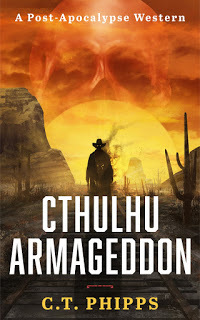
I suggest authors of darker fantasy and science fiction keep this in mind.
C.T Phipps is a lifelong student of horror, science fiction, and fantasy. An avid tabletop gamer, he discovered this passion led him to write and turned him into a lifelong geek. He is a regular blogger on "The United Federation of Charles" (http://unitedfederationofcharles.blogspot.com/).
He's the author of The Supervillainy Saga, Cthulhu Armageddon, Straight Outta Fangton, and Esoterrorism.
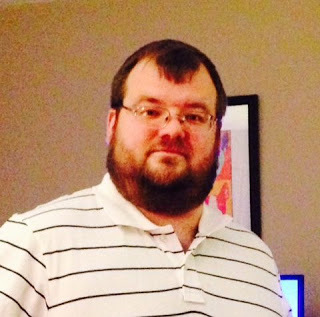
C.T. Phipps Guest Blog – To Kill your Darlings
To Kill your Darlings
By. C.T. Phipps
You need to kill your characters. This is something which I discovered while writing Cthulhu Armageddon and has come with me ever since. I’ve killed beloved characters, I’ve killed hated characters, and I’ve killed characters who might have been important later but got cut off in their prime. I am not George R.R. Martin and probably should have killed more characters but I’m very proud of the ones I have killed.
Why?
For me, I think it’s because killing characters is important to avoid cheating. David Weber, author of the Honor Harrington series, said “If my stories didn’t have the good guys suffer any losses, they wouldn’t be military science fiction, they’d be military porn.” If there’s no risk to the heroes or their loved ones then there’s no stakes. It becomes like Super Mario Brothers where our hero has the star and is just slamming through all of Bowser’s minions like they’re so much confetti he’s running through.
Obviously, not every story needs violent death but many genres do. One of the iconic moments of Star Wars is when Obi-Wan Kenobi is cut down by Darth Vader. A Song of Ice and Fire became a series which distinguished itself from all the other fantasy novels out there when they *Spoiler Alert* chopped off the head of Ned Stark *Spoiler Alert*.
But when should you kill characters?
Which characters should you kill?
What should be the repercussions?
It’s very easy to fall into a trap of killing characters only when it’s heroic and meaningful. Obi-Wan Kenobi dies so Darth Vader can be distracted long enough for Luke and company to escape. Gandalf fights the Balrog for much the same reason. While death is sad, you can certainly say the characters did not give their lives wastefully. I’d argue that even as these moments can have power, it’s often better to subvert this trope.
Death is often meaningless and can happen in the blink of an eye. Part of what makes The Walking Dead comic (and to a lesser extent the show) is characters routinely die due to the hazards of their surroundings. One minute a character is standing there, fine and dandy, the next they’re zombie chow. The suddenness of the violence as well as its finality is something which is authentic to the real world. It can also leave a lasting impression every bit, if not more so, than someone giving their life to save the day.
Which characters to kill is another matter as every cast could use a little pruning but books tend to focus on certain types. The Old Mentor figure and the Love Interest tend to have a disproportionate number of fatalities among them. Indeed, people have come to expect these are the most likely to die in these kinds of stories. After all, the hero eventually outgrows the need for a mentor while love interests tend to be disposable since heroes can always find another. The latter isn’t automatically a sexist attitude but tends to predominately favor women to the point it’s become the personal bugbear of many readers.
On my end, I think a very good idea is to kill the Hero. It’s not a trick which can work multiple times but it occurs to me how interesting of a story it would have been if Luke had died and it would have fallen to Leia to pick up the mantle.
That may be a bit too much for the kind of story Star Wars was telling but Harrison Ford, certainly, thought Han Solo dying would have made the story more powerful. Certainly, it’s important that when a major character dies that you’re going to feel the loss. Famously, Joan Rowling was annoyed when she killed Cedric Diggory and felt guilty only for her daughter to blow it off. Which may explain why she ended up killing half her supporting cast in a grand guginol of epic proportions.
Which was awesome, by the way.
Repercussions are the last thing I think you should keep in mind. The Fellowship didn’t stop thinking about Boromir after he’s gutted by arrows. His death cast a pall on Faramir and Denethor for the rest of the trilogy. Too often, writers put the casualties of their books out of their mind once they’re written out when they should continue affecting surviving characters long after the events which resulted in their associates’ loss.
When writing Cthulhu Armageddon, I had characters I really came to enjoy and cherish as part of the narrative. I ended up killing them, though, because the stakes of the setting demanded that I do so. I could have done a lot more with those characters and some even had stories which would never be told as a result, but it made the post-apocalypse world feel more authentic. This was a world I’d said life was cheap in and by killing the characters I did, I proved it.
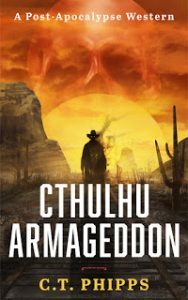
I suggest authors of darker fantasy and science fiction keep this in mind.
C.T Phipps is a lifelong student of horror, science fiction, and fantasy. An avid tabletop gamer, he discovered this passion led him to write and turned him into a lifelong geek. He is a regular blogger on “The United Federation of Charles” (http://unitedfederationofcharles.blogspot.com/).
He’s the author of The Supervillainy Saga, Cthulhu Armageddon, Straight Outta Fangton, and Esoterrorism.

October 10, 2016
Review Blog - Luke Cage Season 1
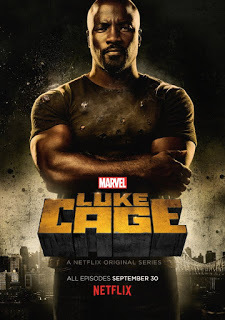
I finished watching series 1 of Luke Cage at the weekend. And... overall I really enjoyed it. But it had some issues. Massive issues that had me trying to explain the insanity to my girlfriend who I think was maybe more content to gloss over them and watch the damned show.
First of all LC was a slow starter in much the same way as Jessica Jones. The first episode was very much a scene setter, showing us the Harlem the characters lived in and introducing us to the initial cast of major players. Not a lot really happened but that was kind of okay. This isn't why it was a slow starter. For the first 6 or 7 episodes there is literally nothing that can harm Luke. He wanders through his story trashing the villains because what the hell can they do. He was so invincible that I found myself more interested in the villain, invested in his struggle to take down the hero rather than the other way around.
When there finally is something that can harm Luke, it's a magical McGuffin. It's Kryptonite. It's dull and lacks imagination. I honestly believe it would have been far more interesting if they'd looked for other ways to hurt look. As Mariah said “Does he have gills?”.
For the most part I found the characters to be interesting and engaging. Luke himself was a bit dry near the beginning, acting very preachy and without any humour, but towards the end he lightened up a bit even as the plot was getting darker. Some of the best moments were him spouting “Sweet Christmas.” or Luke and Claire's corny flirting. It made the characters feel more real and brought a few much needed smiles.
Mike Colter played the part of Luke Cage excellently. I'm not a comic book fan, but he looks the part as far as I can tell, and he certainly felt like an unstoppable man mountain. He really shined during the more intense moments and the the moments of levity as a lot of the action was him walking forwards, squinting while people shot at him.
I really enjoyed Mahershala Ali's performance as Cornell 'Cottonmouth' Stokes. I thought he portrayed a deeply nuanced man trying to play gangsta very well and especially so when he was up against a hero he couldn't even touch. I was honestly far more invested in his struggle than I ever was in Luke's because it felt more real. Cornell was out of his depth and a man who never really wanted to be what he was anyway. I would have much preferred him to be kept as the villain for the entire series.
Alfre Woodard's Mariah Dillard was... off. Something about the performance never gelled for me and I found her completely unbelievable the entire way through. There were points where I wondered if they'd just replaced her with a cardboard cutout.
I could go on about each character in detail but I won't. I will say that I really enjoyed Misty Knight, Shades, and the evolution of Claire Temple from bit parter on DD and JJ to major player.
I had a major issue with the big bad, Diamondback. I don't think it was anything to do with the portrayal, but more to do with the character himself. Nutbar, pseudo-evangelical, murderous psychopath. Honestly he was a dull-as-shit cliché and his... evolution actually hurt the finale as it just turned into a boring slug fest with no actual stakes. I understand that it was a metaphorical battle for the soul of Harlem... but it felt like a pointless punching match to me with no real tension.
The soundtrack was awesome. I loved it from the dramatic percussion work when Luke starts getting all unstoppable, to the musical interludes at the club. There's is nothing else I can really say but I loved it.
There's going to be a few SPOILERS up ahead so you have been warned.
SPOILERS!!!
Some of the dialogue was just cringe-worthy and it seemed to change from episode to episode almost as though each one was written by someone else. One episode had Luke talking about the idea of a person about 3 different times and 3 different people. The first time was fine but the other two felt forced and had me rolling my eyes. There was also far too many “Are you ready? I was born ready.” moments.
Some points in the story just made no sense. None. I'm used to handling science with a bit of blind acceptance when it comes to superhero stories... BUT! In order to surgically remove the bullet fragments from Luke, they put him through the same procedure that made him bulletproof to temporarily unmake him bulletproof. WHAT?!?!? Willing suspension of disbelief only goes so far and this is right up there with freezing laser beams (sorry Flash, had to be said). Just No! It was a thinly veiled attempt to get the scientist doctor guy to rediscover the process so he can make more of Luke for a sequel.
The magical bullet McGuffin's themselves are never actually explained. Luke is bulletproof. The bullets are made from some alien alloy... so what? Why would that matter? They're still metal and fired via conventional methods. Why can these suddenly penetrate his skin? Sorry, I'm not the type of person who just accepts things and moves on, I'd at least have liked them to try to explain it more than just “Alien metal... deal with it.”
At the end of the day, despite some major issues, I really enjoyed Luke Cage and it's another excellent show to add to the Marvel-Netflix roster. I'm looking forward to a second series and I'm looking forward to seeing more of Luke in the Defenders.
Rob J. Hayes is the author of the acclaimed The Ties that Bind trilogy and the upcoming Best Laid Plans duology. You can find out more on his website here .
Review Blog – Luke Cage Season 1
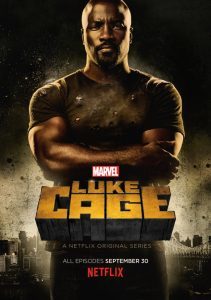
[image error]
I finished watching series 1 of Luke Cage at the weekend. And… overall I really enjoyed it. But it had some issues. Massive issues that had me trying to explain the insanity to my girlfriend who I think was maybe more content to gloss over them and watch the damned show.
First of all LC was a slow starter in much the same way as Jessica Jones. The first episode was very much a scene setter, showing us the Harlem the characters lived in and introducing us to the initial cast of major players. Not a lot really happened but that was kind of okay. This isn’t why it was a slow starter. For the first 6 or 7 episodes there is literally nothing that can harm Luke. He wanders through his story trashing the villains because what the hell can they do. He was so invincible that I found myself more interested in the villain, invested in his struggle to take down the hero rather than the other way around.
When there finally is something that can harm Luke, it’s a magical McGuffin. It’s Kryptonite. It’s dull and lacks imagination. I honestly believe it would have been far more interesting if they’d looked for other ways to hurt look. As Mariah said “Does he have gills?”.
For the most part I found the characters to be interesting and engaging. Luke himself was a bit dry near the beginning, acting very preachy and without any humour, but towards the end he lightened up a bit even as the plot was getting darker. Some of the best moments were him spouting “Sweet Christmas.” or Luke and Claire’s corny flirting. It made the characters feel more real and brought a few much needed smiles.
Mike Colter played the part of Luke Cage excellently. I’m not a comic book fan, but he looks the part as far as I can tell, and he certainly felt like an unstoppable man mountain. He really shined during the more intense moments and the the moments of levity as a lot of the action was him walking forwards, squinting while people shot at him.
I really enjoyed Mahershala Ali’s performance as Cornell ‘Cottonmouth’ Stokes. I thought he portrayed a deeply nuanced man trying to play gangsta very well and especially so when he was up against a hero he couldn’t even touch. I was honestly far more invested in his struggle than I ever was in Luke’s because it felt more real. Cornell was out of his depth and a man who never really wanted to be what he was anyway. I would have much preferred him to be kept as the villain for the entire series.
Alfre Woodard’s Mariah Dillard was… off. Something about the performance never gelled for me and I found her completely unbelievable the entire way through. There were points where I wondered if they’d just replaced her with a cardboard cutout.
I could go on about each character in detail but I won’t. I will say that I really enjoyed Misty Knight, Shades, and the evolution of Claire Temple from bit parter on DD and JJ to major player.
I had a major issue with the big bad, Diamondback. I don’t think it was anything to do with the portrayal, but more to do with the character himself. Nutbar, pseudo-evangelical, murderous psychopath. Honestly he was a dull-as-shit cliché and his… evolution actually hurt the finale as it just turned into a boring slug fest with no actual stakes. I understand that it was a metaphorical battle for the soul of Harlem… but it felt like a pointless punching match to me with no real tension.
The soundtrack was awesome. I loved it from the dramatic percussion work when Luke starts getting all unstoppable, to the musical interludes at the club. There’s is nothing else I can really say but I loved it.
There’s going to be a few SPOILERS up ahead so you have been warned.
SPOILERS!!!
Some of the dialogue was just cringe-worthy and it seemed to change from episode to episode almost as though each one was written by someone else. One episode had Luke talking about the idea of a person about 3 different times and 3 different people. The first time was fine but the other two felt forced and had me rolling my eyes. There was also far too many “Are you ready? I was born ready.” moments.
Some points in the story just made no sense. None. I’m used to handling science with a bit of blind acceptance when it comes to superhero stories… BUT! In order to surgically remove the bullet fragments from Luke, they put him through the same procedure that made him bulletproof to temporarily unmake him bulletproof. WHAT?!?!? Willing suspension of disbelief only goes so far and this is right up there with freezing laser beams (sorry Flash, had to be said). Just No! It was a thinly veiled attempt to get the scientist doctor guy to rediscover the process so he can make more of Luke for a sequel.
The magical bullet McGuffin’s themselves are never actually explained. Luke is bulletproof. The bullets are made from some alien alloy… so what? Why would that matter? They’re still metal and fired via conventional methods. Why can these suddenly penetrate his skin? Sorry, I’m not the type of person who just accepts things and moves on, I’d at least have liked them to try to explain it more than just “Alien metal… deal with it.”
At the end of the day, despite some major issues, I really enjoyed Luke Cage and it’s another excellent show to add to the Marvel-Netflix roster. I’m looking forward to a second series and I’m looking forward to seeing more of Luke in the Defenders.
Rob J. Hayes is the author of the acclaimed The Ties that Bind trilogy and the upcoming Best Laid Plans duology. You can find out more on his website here.
September 2, 2016
Review Blog - Ibenus by Seth Skorkowsky
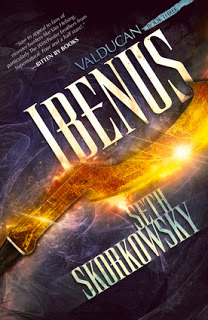
This book is the 3rd in Seth Skorkowsky's Valducan series which follows an order of Templar-ish knights who bond to semi-sentient holy weapons which allows them to both kill demons and develop some pretty funky powers.
Unlike Damoren (which mostly followed Matt) and Hounancier (which mostly followed Malcolm), this book gives us a range of PoVs and Seth manages to make each character feel individual. It's a nice change and gives us a much broader look at the world and at the Valducans. It also gives us a wider view of the various powers/abilities that the holy weapons grant their protectors. I really enjoyed this and I hope Seth comes up with some other crazy powers along the way.
The plot zips along at a fairly break neck pace and, while there are a few moments to stop and catch you breath they don't drag that pace down. Basically it's a bit of a page turner so don't expect to putting it down once you pick it up.
We have a new demon for the Valducans to fight in the form of Mantismeres, giant bug things that create minions... minions who look like a spider crossed with a porcelain doll and wail like a baby. Yeah, cheers for that, Seth, because dolls weren't freaky enough already. This is where the comparison to Aliens comes in because, due to the nature of the enemy they're fighting, the finale plays out like Aliens with our Valducans being the colonial marines. It's a wild ride!
It's hard to review Ibenus without some references and comparison to the previous 2 installments so here goes (some minor SPOILERS will follow).
I had a problem with Hounancier in that it lowered the stakes so drastically. In Damoren our heroes saved the world. Boom! That's about as high as stakes get. Hounancier went completely in a different route and it was a fight to save one man's soul. It was a good book, but Damoren was tough to follow and dropping the stakes to such a personal level reeled back a lot of the tension. Ibenus doesn't have this problem, they're not saving the world, they're maintaining it, but the stakes don't seem small because it follows Hounancier and the stakes are larger. That's a long winded way of saying the stakes aren't that big but they feel big enough.
The other comparison I want to draw is that Damoren felt like a horror novel. We were introduced to characters only to see them murdered in horrific ways. It honestly felt like anyone could die and likely would. Hounancier felt more like a detective novel on crack, it was disjointed by its very nature, but read a bit like a mystery that needed solving. Ibenus read like more like an action novel with swords a swinging, guns a blazing, and an alien queen to stop. It's fun. It doesn't quite have the 'anyone could die' tension that Damoren had, but there's a few wincy moments to be sure.
I do have a couple of issues. Some minor SPOILERS will follow.
There were a couple of things that were unexplained, or at least not well enough explored. There's a holy weapon that bonds to two people at once and they apparently bond to each other as well. I felt this could have been explored a bit better because it left me with questions as to the nature of that bond and how much it impacted the relationship between the two characters.
My other issue is with a specific character who just felt bland and lacking any sort of soul or feeling. They die (I did say SPOILERS). The problem is the character felt as though death was their purpose in the book. I saw it coming because it was obvious they were there to add dramatic tension.
All in all I give Ibenus a solid 4 out of 5. A thoroughly enjoyable action-driven book about demons and the badass knights who slay them.
Rob J. Hayes is the author of the acclaimed The Ties that Bind trilogy and the upcoming Best Laid Plans duology. You can find out more on his website here .
Review Blog – Ibenus by Seth Skorkowsky
Think Aliens meets Constantine and you’ll be pretty close to Ibenus.
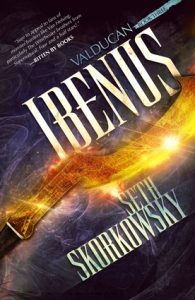
This book is the 3rd in Seth Skorkowsky’s Valducan series which follows an order of Templar-ish knights who bond to semi-sentient holy weapons which allows them to both kill demons and develop some pretty funky powers.
Unlike Damoren (which mostly followed Matt) and Hounancier (which mostly followed Malcolm), this book gives us a range of PoVs and Seth manages to make each character feel individual. It’s a nice change and gives us a much broader look at the world and at the Valducans. It also gives us a wider view of the various powers/abilities that the holy weapons grant their protectors. I really enjoyed this and I hope Seth comes up with some other crazy powers along the way.
The plot zips along at a fairly break neck pace and, while there are a few moments to stop and catch you breath they don’t drag that pace down. Basically it’s a bit of a page turner so don’t expect to putting it down once you pick it up.
We have a new demon for the Valducans to fight in the form of Mantismeres, giant bug things that create minions… minions who look like a spider crossed with a porcelain doll and wail like a baby. Yeah, cheers for that, Seth, because dolls weren’t freaky enough already. This is where the comparison to Aliens comes in because, due to the nature of the enemy they’re fighting, the finale plays out like Aliens with our Valducans being the colonial marines. It’s a wild ride!
It’s hard to review Ibenus without some references and comparison to the previous 2 installments so here goes (some minor SPOILERS will follow).
I had a problem with Hounancier in that it lowered the stakes so drastically. In Damoren our heroes saved the world. Boom! That’s about as high as stakes get. Hounancier went completely in a different route and it was a fight to save one man’s soul. It was a good book, but Damoren was tough to follow and dropping the stakes to such a personal level reeled back a lot of the tension. Ibenus doesn’t have this problem, they’re not saving the world, they’re maintaining it, but the stakes don’t seem small because it follows Hounancier and the stakes are larger. That’s a long winded way of saying the stakes aren’t that big but they feel big enough.
The other comparison I want to draw is that Damoren felt like a horror novel. We were introduced to characters only to see them murdered in horrific ways. It honestly felt like anyone could die and likely would. Hounancier felt more like a detective novel on crack, it was disjointed by its very nature, but read a bit like a mystery that needed solving. Ibenus read like more like an action novel with swords a swinging, guns a blazing, and an alien queen to stop. It’s fun. It doesn’t quite have the ‘anyone could die’ tension that Damoren had, but there’s a few wincy moments to be sure.
I do have a couple of issues. Some minor SPOILERS will follow.
There were a couple of things that were unexplained, or at least not well enough explored. There’s a holy weapon that bonds to two people at once and they apparently bond to each other as well. I felt this could have been explored a bit better because it left me with questions as to the nature of that bond and how much it impacted the relationship between the two characters.
My other issue is with a specific character who just felt bland and lacking any sort of soul or feeling. They die (I did say SPOILERS). The problem is the character felt as though death was their purpose in the book. I saw it coming because it was obvious they were there to add dramatic tension.
All in all I give Ibenus a solid 4 out of 5. A thoroughly enjoyable action-driven book about demons and the badass knights who slay them.
August 30, 2016
Review Blog – Deus Ex: Mankind Divided
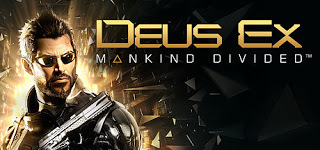
Agonised about how to rate this one. On the one hand it's Deus Ex! The gameplay and mechanics are still in tact and Adam (Batman) Jensen is still as awesome and droll as ever. On the other hand it has some MAJOR flaws.
For anyone who doesn't know, DE: Mankind Divided (MD) is the follow up to the hugely successful 2011 game DE: Human Revolution (HR). It's a cyberpunk stealth/action thriller which sees our protagonist, Adam Jensen, as the most badass cyborg alive. He stealths or shoots his way through the story to uncover the truth behind the big bad corporations that control the world.
So HR was an amazing game. I put it as my favourite of 2011 (even pipping the juggernaut that is Skyrim) and gave it a 4.5. It only missed out on the final 0.5 because of the infuriating and lack lustre boss fights. I mention this because it shows how big a stick MD had to live up to.
The gameplay in MD is very much the same as it was in HR and I'm all sorts of OK with this. It ain't broke so please don't go trying to fix it. There are more augments that you can unlock and a whole host of fancy new tricks that come along with them... none of which did I use. Honestly I played through the entire game with cloaking, hacking, smart vision, and both long and short range non-lethal guns. I may have to play through it again to play with the new gadgets. But this just proves my point, the gameplay is the same as the first game and that's a good thing. The DE series is, in my eyes, the best stealth-em-up game on the market today. It's fun, challenging, and varied and there are usually multiple solutions to each problem. I can't really attest to how well the run-and-gun style of gameplay holds up because that's just not how I roll. Adam Jensen is a stealthy ninja cyborg Batman and that's all there is to it.
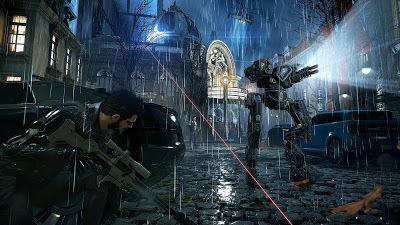
There are choices to make and I'm not just talking about the obvious times when you have 2 missions and enough time to complete only the 1 of them. The actions you take during missions can have knock on effects. One mission had me breaking into a secure train station to steal a thing and I triggered an alarm along the way, no sooner was I back at HQ I was being chewed up by the boss for causing a ruckus. Another mission had me trying to abduct a leader of a cult in a hostile city, I navigated my way to the dood in charge without killing a single soul (actually I managed the entire game without a single death to my name) and the leader recognised this. They are small decisions you make but they matter and that gives the world a more real, lived in feel.
Onto the world and setting. I love the world DE gives us. I love the cyberpunk feel where giant corporations exist and control everything. I love the idea of gangs taking over entire sections of cities. The idea that after years of research augments (cybernetic implants) aren't just for those who have lost a limb or the like, but people purposefully get these augments installed to be more than human.
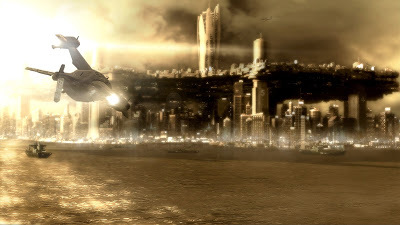 Hengsha, a city so crowded they had to build a second city on top of the first.
Hengsha, a city so crowded they had to build a second city on top of the first.In MD the golden age of augments has passed and the world has moved onto a much darker time. People with augments are feared and segregated, treated as second class citizens and stripped of basic human rights. It's forced down our throats a bit but that's not necessarily a bad thing. Shit like this has actually happened in the real world, is still happening in bits of it, and sometimes we need a very graphic reminder of this to convince us that it really did/does happen and it's not OK. I mention this because I know a few people who got a bit pissed off at how often the prejudicial theme was brought front and centre, but personally I thought it was core to the very story that is being told and deserves to be there in front of us the entire time we are playing. This isn't something we should ignore or forget because history has a habit of repeating itself and that's simply not something we can allow in this case.
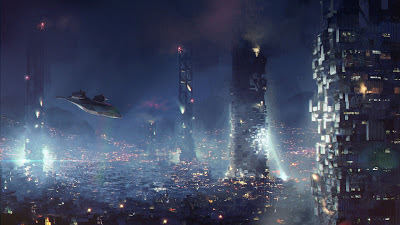 The visuals are still simply stunning.The soundtrack! You might think it odd that I mention this, I don't usually, but there's a reason. HR had an amazing soundtrack, so much so I purchased it. The music was perfect for the setting and hit all the right notes. MD has a decent soundtrack by way of comparison, but it lacks the same impact. It is there, but it does not stand out.
The visuals are still simply stunning.The soundtrack! You might think it odd that I mention this, I don't usually, but there's a reason. HR had an amazing soundtrack, so much so I purchased it. The music was perfect for the setting and hit all the right notes. MD has a decent soundtrack by way of comparison, but it lacks the same impact. It is there, but it does not stand out.So the one thing that MD does heads and shoulders better than HR is the boss fights... or lack thereof. In HR there were 4 boss fights and all had just 1 solution: kill the bad guy in a big shoot out. In a game that sold itself on being able to navigate it by stealth without killing (if you so choose) this was a big red cross. It sucked. MD has 1 boss fight right at the end... at least it did the way I completed it. It's still a bit of an arena fight, but you don't have to go all shooty shooty. I did not, I beat the bad guy unconscious and handed him over to the authorities like the good little pacifist I am.
Right, so how does MD earn its lack of rating. Why do I give it a 3 out of 5. Well there's 2 reasons and they're both linked. First is that the game is short. I spent about 20 hours on the main story (including many of the side quests) and that's with a bit of reloading when shit went sideways and about an hour on pause because a family member phoned me. In reality, I would say there is about 15 hours of gameplay at best. Now I didn't find and do everything, but I did a fair amount. The game is short and that's a fact, especially when compared to its predecessor.
The second reason is this. MD suffers very heavily from middle syndrome. This is a thing! In terms of a trilogy the first story (book/film/game) is usually a good scene setter and a full story all itself, the second often feels like it isn't a full story but only half a tale, setting up things for the final instalment. MD is this second story. I've heard it described as it ends on the second act and it's true, it does.
I was fighting the big boss and I took him down, knocked him unconscious and celebrated with a sip of rum. My girlfriend, who was watching, turned to me and asked if that was it. I said “No. Just beaten this bastard.”... then the credits rolled.
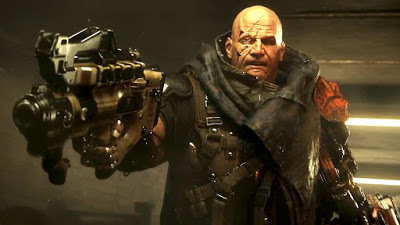 This dood is a lackey. He screams "lackey".I was actually shocked because that wasn't a full story at all. The guy I'd just beaten was nothing more than a lackey for the shadowy higher ups and I knew that. Adam Jensen knew that. At this point, everyone in the story knew that. I felt cheated. I still feel a bit cheated because it only feels like half a game, half a story. There are SO MANY threads that are left completely open and unexplained. As far as a story goes it was disappointing, not because of its content, but because its lack of resolution.
This dood is a lackey. He screams "lackey".I was actually shocked because that wasn't a full story at all. The guy I'd just beaten was nothing more than a lackey for the shadowy higher ups and I knew that. Adam Jensen knew that. At this point, everyone in the story knew that. I felt cheated. I still feel a bit cheated because it only feels like half a game, half a story. There are SO MANY threads that are left completely open and unexplained. As far as a story goes it was disappointing, not because of its content, but because its lack of resolution.One other minor gripe is that I would have liked to see a few more of the supporting cast from HR in the mix. The new cast is fine, though a bit bland, but I missed the antagonistic self-important of Pritchard. Even the pilot was a bit 1 dimensional when compared to Malik from HR.
All in all Deus Ex: Mankind Divided gets a 3 out of 5. Gameplay and setting are fantastic, but the story and size are a severe failing. What does this mean? Well I'll still pick up the 3rd game in the series, but I won't be going anywhere near the DLC.
Rob J. Hayes is the author of the acclaimed The Ties that Bind trilogy and the upcoming Best Laid Plans duology. You can find out more on his website here .
August 10, 2016
Review Blog - The Forty First Wink by James Walley

I'll start by saying this isn't my normal sort of book. I tend to stick to reading Fantasy with a healthy smattering of sci-fi. The Forty First Wink exists in a genre all of its own and if I had to name it I'd probably call that genre Pratchett.
The Forty First Wink follows our protagonist, Marty, as he struggles to wake up. Sounds a bit odd, but that's pretty much the long and short of it. Marty wakes up in his own dream and has to try and find a way out of it. Along for the ride he has a crew of tiny toy pirates, a flying pirate ship, his literal dream girl, and a geriatric not-so-super hero. He soon realises that not everyone in his dream wants him to wake up and chief among those arrayed against him is his own worst fear, clowns.
The story is a lot of fun, though definitely requires a fair amount of leaving your brain outside. I caught myself questioning logic a couple of a times before realising that it was a dream and therefore not entirely supposed to make sense. The pace is roaring, actually it rarely slows down. It's set over the course of a single day... inside dream space, and steadily adds new characters, new areas, and new set pieces.
Marty himself is about as normal as a protagonist can be really. I'm pretty sure he was designed to be the modern every-man and we get to see him grow as the story progresses. In many ways it's about him finding his courage, kind of like a modern Wizard of Oz... actually very much like a modern Wizard of Oz now I think about it. So Dorothy is likeable enough, despite being quite dense at times, and propels the story along nicely in his attempt to wake up.
The stand out character is without a doubt Timbers, the tiny toy pirate captain. Timbers is just pure fun, witty one liners, and a zest for life. He's pretty much Buzz Lightyear... but a pirate... and self-aware.
There are some genius lines in The Forty First Wink. Lines that you might expect from Terry Pratchett or Douglas Adams. They actually made me laugh aloud at times and it's quite rare a book manages that.
I have a couple of gripes with the book. Adverbs. The book houses a few too many of them and once I noticed that it became hard to stop noticing it. They're everywhere at times and often completely superfluous... (sorry, had to do it). Most folk probably wouldn't notice, but I did and it kept pulling me out of the narrative.
The other issue is that often I found things over explained or described, leaving little to the imagination which actually hurt my ability to imagine it. I think the author needs to trust in his readers' imagination a bit more.
In the end I give The Forty First Wink 3 stars. The biggest problem I found was that I'm just not really too big a fan of comedy in my books. I found the same when reading Pratchett; I like humour while reading, not comedy.
Rob J. Hayes is the author of the acclaimed The Ties that Bind trilogy and the upcoming Best Laid Plans duology. You can find out more on his website here .
August 8, 2016
Review Blog - Providence of Fire by Brian Staveley
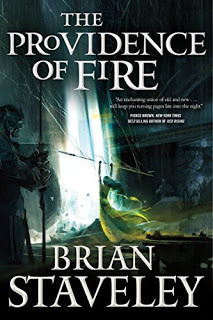 Still some of the most gorgeous covers ever.Been struggling with this review for a few reasons. Finally figured I'd just pull it together. Here goes.
Still some of the most gorgeous covers ever.Been struggling with this review for a few reasons. Finally figured I'd just pull it together. Here goes.I listened to the audio version and therefore may get a few names wrong as spelling is hard.
Providence of Fire(PoF) picks up directly where The Emperor's Blades(TEB) left off. There's pretty much no time lost and we see the characters in the same dire peril we left them in. Kaden and Valyn are united and determined to uncover the plot that tried to slay them both, avenge the death of their father, and plonk Kaden's arse down on the Unhewn Throne. Adare is doing Adare things; sleeping with the enemy, realising she's sleeping with the enemy, running away.
I'll start with Simon Vance's narration. This guy continues to impress. He has a good range of voices, none of which sound forced or unnatural and he does an excellent job of giving characters unique voices so you can tell who you're on board with even before the text specifically states it. One interesting thing I did notice was that a few of the voices and pronunciations have actually changed since TEB. This is probably just the author correcting inaccuracies. I'm pretty sure Simon Vance's voice was designed for reading epic fantasy and there's little higher praise I can give it than that.
So what did I love about this book? Well there was a lot to love. We get a much deeper look into some of the characters and I'm not just talking about the back stories that TEB layered upon us. PoF is very much a book living in the present whereas TEB felt like a book living in the past. If Staveley completes the trend with The Last Mortal Bond(TLMB) feeling like it lives in the future, I will be very impressed.
We get a much greater look at the world and the various factions inhabiting it. That being said, the world continues to feel very tightly packed with everything happening in just a small section (geographically speaking). I don't doubt the world is very large, but for that reason it feels very small. Everybody seems to be within a few days/weeks travel of each other and ALL the important events are happening around Anore (?) as if the rest of the world doesn't really matter.
Tristae (?) is awesome. Possibly my favourite character (after Valyn) because of the way she flits between helpless little girl to hand-crushing nutbar. She's definitely one of the most interesting and not just because of the secret she's hiding.
Gwenna is another highlight as the foul-mouthed demolitions expert. She's worth mentioning as well as we start getting PoV chapters from her perspective... which seems odd. Up until now all the PoVs have been the Emperor's Blades; his 3 children. Now that changes and suddenly we have Gwenna chapters. Don't get me wrong, they're interesting and fresh and probably some of the best chapters... it just seems odd, almost as though Staveley really wanted to tell more of the story and had to break his own formula to do it. I'm glad he did though as Gwenna's chapters are certainly some of the most rewarding.
Kaden is... Kaden. He still feels like a potato. He goes around, he does things (important things), and yet he's just so hard to connect with that I struggled to care about his plight.
Adare is still as useless as she was in TEB. I really wanted to like her and for her character to flourish, but she's too much like Dany-fucking-Targaryen for me. One mistake after another and doesn't give a damn what any of the people around her (advisers appointed by her) say. Maybe she gets more likable in TLMB, I'm told she does... but then I was told she does in PoF... lies.
Valyn, despite making some face-palm choices, is the bright light. I think I would have preferred books written all from his perspective, but then telling the whole story would be pretty much impossible. He's a broken man who is a product of a very harsh past and continually tries to put himself back together even when he just wants it to stop. He's fascinating and compelling and drives the story forward and keeps me coming back to find out more. I can't wait to see how he progresses into TLMB because he's left on a fair cliffhanger and I can only imagine he's going to become even more of a badass.
OK, time for biggest gripe (and it's a biggie). There is SO MUCH FAFFING AROUND in this book. There was a bit in TEB, but that was to be expected as there was a lot of scene setting, world setting, character back story. In PoF there's just a lot of people wandering somewhere, wandering elsewhere, splitting up, getting back together, doing a thing, doing the opposite thing. The book waffles and it slows down the pace to a crawl at times. That's not to say that there are chapters where nothing important happens, just that often those important things are surrounded by the rest of the chapter where nothing happens. The book is slow, lethargic at times, and it's why I struggled through much of it... and why I'm struggling to get into TLMB at the moment.
So that's about it. I enjoyed Providence of Fire, but not as much as The Emperor's Blades. I give it 3 stars.
Rob J. Hayes is the author of the acclaimed The Ties that Bind trilogy and the upcoming Best Laid Plans duology. You can find out more on his website here .



